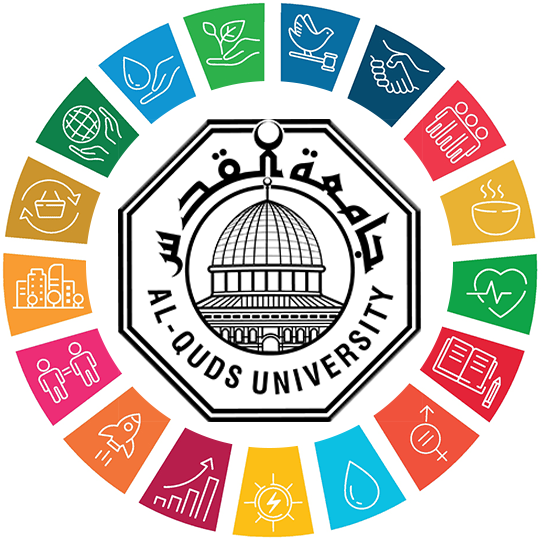Worldwide consumption and production depend on the use of the natural environment and resources in a way that continues to have destructive impacts on the planet; we have not utilized them responsibly and currently consume far beyond what our planet can provide. We must learn how to use and produce in sustainable ways that will reverse the harm that we have inflicted on the planet, and achieve the environmentally sound management of chemicals and all wastes throughout their life cycle, in accordance with agreed international frameworks, and significantly reduce their release to air, water and soil in order to minimize their adverse impacts on human health and the environment.
Al-Quds University is committed to promoting responsible consumption and production patterns, recognizing their importance in achieving environmental sustainability, social equity, and overall well-being. The university contributes to SDG 12 through various means:
Education in Environmental Sciences, Management, and Sustainable Development: Al-Quds University offers undergraduate and graduate programs in environmental sciences, management, and sustainable development, providing students with the knowledge and skills needed to develop and implement sustainable consumption and production practices. These programs focus on topics such as resource efficiency, waste management, and circular economy principles, preparing students for careers in various sectors.
Research on Sustainable Consumption and Production: The university conducts research on issues related to sustainable consumption and production, including studies on resource efficiency, waste reduction, life cycle assessment, and sustainable supply chains. This research helps advance the understanding of sustainable consumption and production practices and provides valuable insights for evidence-based policies and strategies.
Collaboration with Industry and Stakeholders: Al-Quds University works closely with industry partners, government agencies, and non-governmental organizations to address sustainable consumption and production challenges. Through joint research projects, workshops, and knowledge sharing, the university provides technical assistance and support to help these stakeholders develop and implement sustainable consumption and production solutions.
Sustainable Campus Initiatives: The university is committed to promoting responsible consumption and production practices on campus, implementing resource-efficient infrastructure, waste management practices, and sustainable procurement policies for students, faculty, and staff. These efforts help reduce the environmental footprint of the university and serve as a model for other institutions and organizations.
Community Outreach and Capacity Building: Al-Quds University actively engages in community outreach programs that promote awareness about responsible consumption and production. These initiatives involve providing education and training to local communities on topics such as waste reduction, recycling, energy efficiency, and sustainable agriculture, empowering them to adopt more sustainable lifestyles and practices.
Advocacy and Policy Development: Al-Quds University plays a key role in advocating for policies and strategies that promote responsible consumption and production at local, national, and international levels.
Promoting Entrepreneurship and Innovation: The university supports entrepreneurship and innovation in the field of sustainable consumption and production by providing resources and support to students, faculty, and alumni interested in launching their own businesses or social enterprises. This includes mentorship programs, workshops, networking events, and access to funding opportunities, helping to foster a culture of innovation and contribute to the development of sustainable products and services.
In summary, Al-Quds University is dedicated to achieving SDG 12 through a comprehensive approach that includes education, research, collaboration with industry and stakeholders, sustainable campus initiatives, community outreach and capacity building, advocacy and policy development, and promoting entrepreneurship and innovation. By promoting responsible consumption and production patterns, the university plays a vital role in fostering environmental sustainability, social equity, and overall well-being.
SDG 12 (Responsible Consumption and Production) Progress:
Al-Quds University has been actively working towards achieving Sustainable Development Goal (SDG) 12, which focuses on responsible consumption and production, through a range of innovative and impactful initiatives.
Central to their efforts is the provision of education in environmental sciences, management, and sustainable development. The university’s academic programs are tailored to equip students with critical knowledge and skills in sustainable consumption and production practices. These programs cover essential topics such as resource efficiency, waste management, and circular economy principles, thereby preparing students for meaningful careers in these crucial sectors.
Research is another cornerstone of Al-Quds University’s approach to SDG 12. The university engages in extensive research on various aspects of sustainable consumption and production, including resource efficiency, waste reduction, life cycle assessment, and sustainable supply chains. The insights gained from this research are not only advancing the understanding of sustainable practices but are also instrumental in shaping evidence-based policies and strategies.
In terms of practical implementation, Al-Quds University collaborates closely with industry partners, government agencies, and non-governmental organizations to tackle sustainable consumption and production challenges. Through these partnerships, which involve joint research projects and knowledge-sharing workshops, the university has been able to provide technical assistance and support in developing and implementing sustainable solutions.
On its campus, the university is committed to embodying the principles of SDG 12. This commitment is reflected in the implementation of resource-efficient infrastructure, waste management practices, and sustainable procurement policies. These campus initiatives serve as a model of responsible consumption and production practices, reducing the environmental footprint of the university and setting a precedent for other institutions to follow.
Community outreach and capacity building are also integral to Al-Quds University’s strategy. The university conducts various programs that aim to raise awareness about responsible consumption and production among local communities. These initiatives, focusing on waste reduction, recycling, energy efficiency, and sustainable agriculture, empower community members to adopt more sustainable lifestyles and practices.
Additionally, Al-Quds University actively engages in advocacy and policy development to promote sustainable consumption and production at local, national, and international levels. This advocacy plays a vital role in influencing broader policy frameworks and encouraging the adoption of sustainable practices.
Moreover, the university fosters a culture of entrepreneurship and innovation in sustainable consumption and production. By providing resources, mentorship, and funding opportunities, Al-Quds University encourages the development of innovative and sustainable products and services, contributing to the growth of this vital sector.
